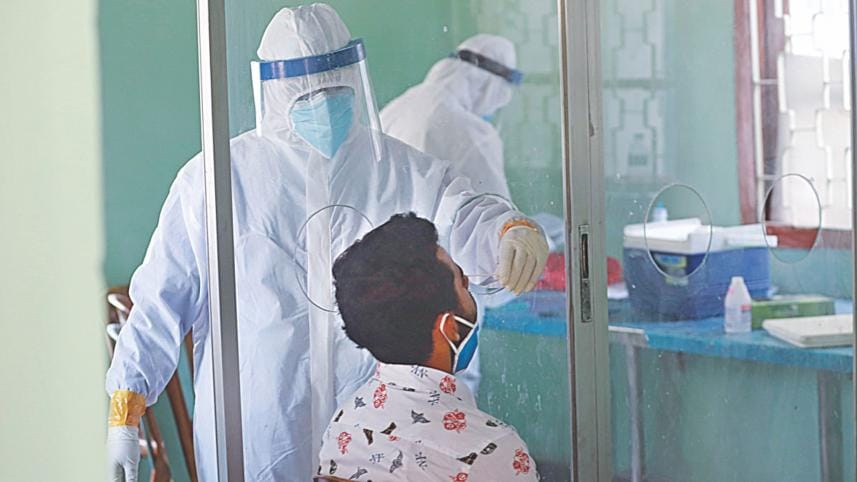COVID-19: No careless loss or death - prevention is possible

Bangladesh is a country where an estimated 3.05 physicians per 10,000 population and 1.07 nurses per 10,000 population existed in 2011 (estimates based on MoHFW HRD 2011). 'The country has only 6 doctors, nurses, and midwives for every 10,000 population, according to the latest report of health bulletin published yearly by the Health Ministry.' 'The current doctor-patient ratio in Bangladesh is only 5.26 to 10,000, that places the country at the second position from the bottom, among the South Asian countries, according to the World Health Organisation (WHO). Even more severely shocking reality is, "The coronavirus mortality rate in doctors in Bangladesh is around 4 percent, the highest in the world," also the rate of coronavirus infections among health workers is very high in Bangladesh compared to other countries. We assume the health workers mentioned include cleaners, and other health service providers, drivers etc. This is supported by the information informally coming from all over from the victims/survivors, families, colleagues, friends, professionals, media and others.
We know that one of the reasons behind these many deaths can be from lack of use or use of low-quality medical gears. Surprisingly, the deaths in non-COVID-19 hospitals are more than that in COVID-19 hospitals. There can be a logical conclusion that the hospitals that are marked to serve COVID-19 patients are more careful in handling new patients than the non-COVID-19 hospitals. There are possibly patients in the non-COVID-19 hospitals who went for other services without knowing that they already caught the virus, it is quite possible as a large number of COVID-19 patients can be asymptomatic and also with the very poor, expensive and time consuming testing system currently in the country it is quite possible that they never had the chance of going through the testing procedures. Also, the lack of available treatment and doctors for non-COVID-19 patients is possibly a reason for the high number of deaths in non-COVID-19 hospitals.
Every day we are observing and hearing from the media how medical professionals were ill-treated by the hospital management/administration, even though they were supposedly provided with gears and equipment, hospitals are arranging their food, accommodations, transportation etc. But, in reality, sometimes after hours of duty the doctors never find hotel accommodations, neither food nor bed to sleep, they possibly had to spend all night on roads and footpaths. This scenario has to change, this country needs to save their talents, their intellectuals, their professionals, their service providers, their people. We lost our brains once in 1971, the day was December 14th which is marked as the 'Martyred Intellectuals Day'. The killings were undertaken to annihilate the intellectual class of what was then East Pakistan. Bangladesh has to stop the death of these martyrs killed by the COVID-19 attack and time is now to take steps. Keeping hospitals, their doctors, nurses and all other auxiliary related to the health service system safe, hygienic equipped is one of the important steps to take forward and it should take as a movement to save the people of Bangladesh.
Now is the high time that all other offices (government and private sectors) are also trying or/and thinking of opening up on a large scale despite the non-decreasing sign of COVID-19 pandemic visible in the country, especially in places of high population density. For livelihoods arguments, if and when the offices will declare open, this is a time to take appropriate all-inclusive precautions to protect our medical professionals and the service providers, to other office staff, Vis a vis our families, and the society as a whole. A well shared, transparent, institutionally accepted safety and hygiene strategy and following actions can protect and save the life of this population, and like all good strategies, there needs to be a timeline to follow and monitoring of the progress and challenges/ The most important aim is to keep every member of the team of the institution safe and protected from infection. The major steps to take at the institutional level are:
For general protection measures for all kinds of workplaces/offices:
- Make public endorsement /announce in the office/hospital that they are opening (for addressing COVID-19) or other work. Every office's utmost responsibility is to ensure implementations of every possible step and regular monitoring for assessment to keep the staff and / team safe and protected.
- COVID-19 dedicated strategy and policy formulated and publicly announced.
- Orient and train the employee on new-normal in professional, technical and lifesaving behaviour change aspects. Training and assessment of new norms are a must at all levels.
- Special psycho-social counselling for the patients or/and their attending family members before and after taking any medical procedure to the patient, for patients/relatives attendants to take informed decisions. Counselling arrangements are an added value for the institutions/organization's management.
- Provide technical training to nurses, cleaners, janitors, administrative staff, guards and drivers on what is new normal in terms of cleanliness, protection and safety.
- Follow up, assess and take regular corrective measures for improvements of every new-normal knowledge, skill and behaviours.
- Enforce appropriate/logical/ equitable incentives, motivation, rewards and disciplinary procedures/measures in a transparent, logical and equitable manner.
- If extra dress, equipment, any other attires (shoes and glasses) are needed by the service providers they should be provided by the employers.
- Cleaning and disinfecting offices, hospitals, equipment, beds, toilets, floors, dust/garbage bins, air ventilation, toilets, meal areas, vehicles, canteen, etc. are becoming the major responsibility of the institutions, much more than before.
- Suitable and agreed office time as per the requirement to provide the best services and suitable to the majority.
- Elderly, sick people with non-communicable diseases (NCD), pregnant, mothers, persons with disabilities can work from home with adequate office supports if needed, such as computers, network facilities, seating arrangements, etc. with a time-bound demand.
Along with this there are specific and special measures to be enforced for medical institutions:
- 1. Start infection control programme for every hospital without delay
- 2. Restrict areas of hospitals in red, yellow and green zones with enough visibility maintained with notices or directions so that the areas can be identified easily by experts and the visitors.
- 3. The outdoor and emergency section has to have enough triage. 'Triage' is essential in COVID-19 situation. It is to be done at the entry to the hospital. Every patient is scrutinised here for possible COVID-19 and then sent to designated color-coded areas. It is to avoid mixing of COVID-19 with non-COVID-19 ones.
- 4. Ensure quality and need-based, a non-interrupting supply of masks, PPEs, gloves etc.
- 5. Ensure very strict measures to restrict the entry of external and other visitors.
- 6. Make it compulsory to appropriately wear suitable masks in hospital premises.
- 7. Use relevant and appropriate air filters in all operation theatres and intensive care units.
- 8. Ensure needed 'isolation' for all (levels and types) health workers.
- 9. Ensure proper, need-based, standard and clean, hygienic and well equipped ambulances to transport patients.
- 10. Ensure shift duties for all health service providers, including cleaners, logistics, drivers, etc.
- 11. Restrict people with old age, pregnant, complicated illness (cancer, diabetics, kidney failure) to get in direct contact with any patients.
- 12. Everywhere social distancing is to be maintained in the hospital, such as, inter bed spacing (at least 6 feet), short follow-up, digital round, non-touch instruments, etc. Avoid going to a patient unless necessary. Modern hospital systems adopted digital rounds. On duty doctor goes to the patient and collect information. Then the patient is discussed with other colleagues (mostly seniors) over the internet. Direct video monitoring of patients helps further.
The realisation of everyone now is that it is high time that all institutions be prepared and implement 'work from home' guidelines as soon as possible considering new norms, the fulfilment of overall responsibilities/duties, work-family balance, the best possible options for both employees and the employers are to be considered.
These are some of the themes/points to give us a guideline to be safe and protected from viruses, it can be taken to develop a checklist as per the specifications of individual institutions. The most important aim is to keep everyone related to the service (bottom-up) either a hospital or any other office/factory safe and healthy to attain excellence in productivity with the highest effectiveness and efficiency. Safe and healthy happy workplaces lead to the highest productivity of performance.
Both parties (employers and employees) have to show extraordinary compassion and volunteerism in this emergency humanitarian situation, which to be included in the performance assessment criteria.
Institutions to be more prepared with an effective cost analysis to attend the potential extraordinary expenditure (i.e. training, monitoring, hygiene, equipment, service sectors etc.) to address long term relevant implications due to COVID-19 situation.
The COVID-19 pandemic disrupted 'the usual normal' that historically emerged and was once (before the world attacked by this COVID-19) taken as granted, the usual behaviour, connections, systems and portfolios, in a way it challenges the human co-existence of relationship building and with the climate predicament approaching there can be many more pandemics related to environmental calamities – as already Bangladesh has started facing tides and typhoons in higher frequencies. Behaviour change is one of the key areas to look into more intensively. First and foremost, the people need to survive in a hygienic and protected environment to be effectively productive and lead a healthy living with higher intellectual capacity.
Sheepa Hafiza is an equality and rights activist.




 For all latest news, follow The Daily Star's Google News channel.
For all latest news, follow The Daily Star's Google News channel.
Comments